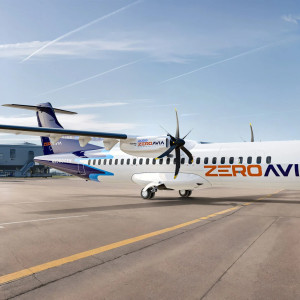ZeroAvia to build hydrogen engine facility at Glasgow Airport


Hydrogen-electric engine start-up ZeroAvia has announced that it plans to build a major manufacturing facility for production of its hydrogen-electric powertrains at the Advanced Manufacturing Innovation District Scotland, close to Glasgow Airport in Renfrewshire. The company says it has received around 3,000 engine and component pre-orders, amounting to around £10bn in future orders, and that this new testing and production facility will enable it to meet demand, along with the creation of 'hundreds' of high-skilled jobs in the region. READ: Alaska Airlines, ZeroAvia developing zero-emission aircraft[1]
The project in Scotland has been made possible by a GBP9m Regional Selective Assistance grant from Scottish Enterprise. This follows an equity investment of GBP20m from the Scottish National Investment Bank into ZeroAvia as part of the company's Series C funding, with the UK National Wealth Fund investing GBP32 million as a cornerstone-level investor in the round. The Series C funding round was led by Airbus, Barclays Sustainable Impact Capital and NEOM Investment Fund.
The UK Government awarded ZeroAvia and consortium partners GBP10.5 million to develop the advanced HTPEM fuel cells in 2024 via the Aerospace Technology Institute (ATI) programme in conjunction with the Department for Business and Trade and Innovate UK. The UK Government has awarded ZeroAvia GBP18.5 million total R&D funding since 2019 to develop their fuel cell and powertrain technology. This support alongside more than £250 million private investment has enabled the company to make progress: flying the world's first hydrogen-electric commercial scale aircraft in 2020, more than doubling the power output to again fly the world's largest hydrogen-electric aircraft in 2023, manufacturing and shipping fuel cell systems to customers, and securing significant regulatory traction for the certification of its powertrains.
Val Miftakhov, Founder & Chief Executive, ZeroAvia, said: "Scotland has some unique advantages for ZeroAvia with strong aerospace and engineering skills, a burgeoning hydrogen sector and a clear aviation strategy with potential for early adoption of zero-emission flights. The aviation industry is on the cusp of the biggest transformation since the advent of the jet age, with entirely new propulsion systems set to power the next era of aviation - cleaner flights, better economics and better experiences for all." "With this new facility, Scotland has a big role to play in driving this transformation.
We welcome the grant award from Scottish Enterprise and the support of our equity investors that has enabled us to move into another phase of manufacturing readiness as we progress towards certification of our first engines."
References
- ^ Alaska Airlines, ZeroAvia developing zero-emission aircraft (www.aviationbusinessnews.com)